On The Record With Whittier’s David Kasa, Head Coach of the DIII Men’s Polo National Champs
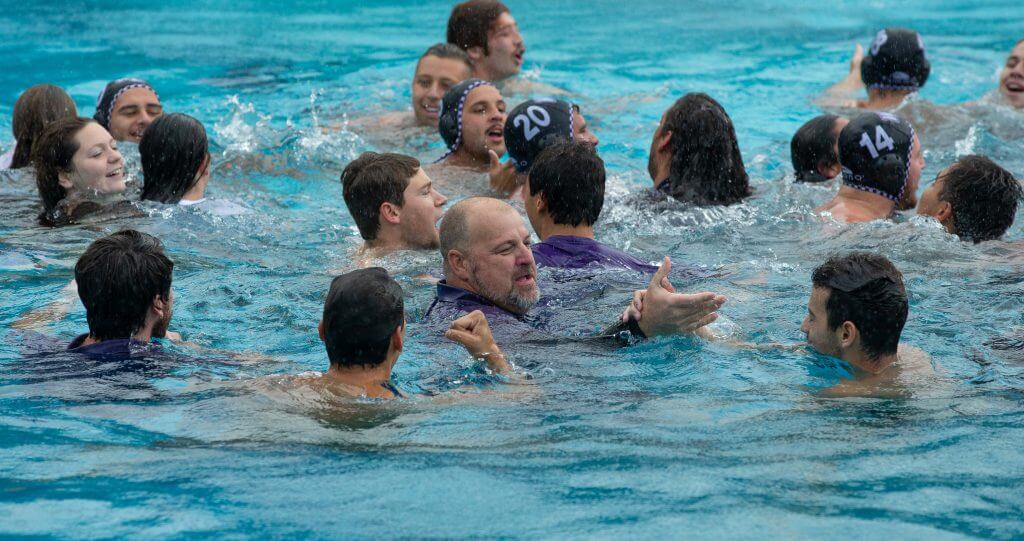
WHITTIER, CA. In one of the year’s most noteworthy polo developments, USA Water Polo, the Collegiate Water Polo Association (CWPA) and the Southern California Intercollegiate Athletic Conference (SCIAC) staged the first-ever national DIII men’s championship. On Sunday at Whittier’s Lillian Slade Aquatic Center, the host Poets put on a defensive clinic in beating SCIAC rival Claremont-Mudd-Scripps (CMS) 5-3 to claim the inaugural DIII Collegiate Men’s Water Polo National Championship title.

If Whittier Head Coach David Kasa has his way, this will be the first of many championships for the Poets.
A burly, bear of a man, Kasa has been on the job only 19 months, but in that time, he has completely transformed the polo culture at the small liberal arts college whose biggest claim to fame may be that it’s the alma mater of disgraced former U.S. President Richard M. Nixon.
In speaking with Kasa, both prior to the tournament’s opening matches on Saturday, and then sitting in on a jubilant press conference following the Poets title-winning effort, the top dog for the Poet’s men’s and women’s polo programs is passionate, honest and — perhaps most important — endearingly self-effacing about a program that is representative of Whittier while aspiring to be one California’s best.
***
SELECT COMMENTS FROM SUNDAY PRESS CONFERENCE:
– General statement about Whittier’s DIII win.
It feels great. I don’t think it’s really sunk in, but when the game finished, to see the guys so excited and jumping in the pool…. A lot of work went into this. This was our long-term goal the whole season.
To work hard and accomplish a goal that you set is a really beautiful thing. To have this euphoria of winning out — seeing these two guys (co-captains Hans Zdolsek and Dominick Nevarez at the press conference) finish their last polo game here at Whittier with a win is just tremendous.
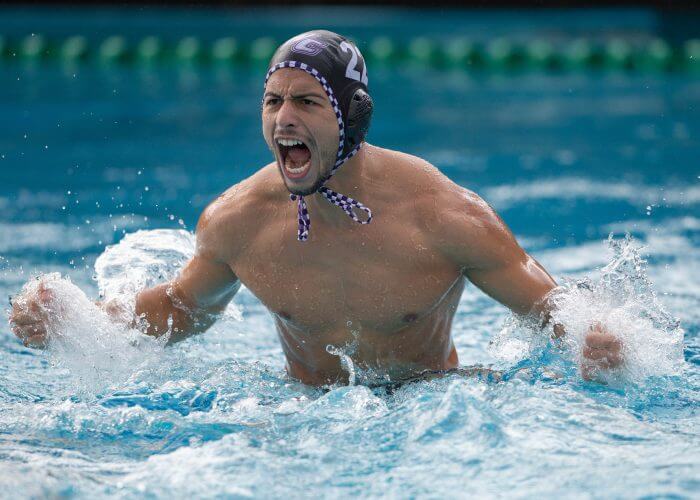
Whittier’s Dominick Nevarez. Photo Courtesy: Tony Leon
I’m excited for the guys. I’m so proud of them. I tell them all the time I love this group — they’re just a beautiful group of guys that work really hard, [are] good teammates.
I’m very proud of them.
– On what makes the recruiting model at Whittier different than other SCIAC schools.
Coming from coach community college [at Long Beach Community College], every year is a different team. I’m very used to that. I’ve been recruiting throughout this season, while I work.
I hope this experience with the USA Water Polo DIII Championship shows student athletes an experience they could have. The passion of water polo that we have. The skill sets of these guys, the camaraderie, the experiences they could have.
I talked to a lot of people afterwards and they thought it was a wonderful event. They were excited for us but the overall event brings a lot of excitement to water polo at this level and a lot of opportunities for people if they can see it.
***
INTERVIEW IN THE WHITTIER AQUATICS OFFICE ON DECEMBER 6:
– This tournament is not just a great opportunity for DIII schools, but for Whittier College.
We’re super excited to host the first DIII national championship at Whittier. It was a really great year for us. It was always a goal for us to try to win SCIAC, especially going against great programs in our conference. Obviously, Pomona and CMS have had a lot of success, but Redlands is also a really well-coached program.
Going against all of these great programs, we knew it’d be a hard goal, but it was our goal to win the tournament so that we could host this. To bring in great institutions like MIT, John Hopkins and CMS. All get to host here. The college is super excited and proud to host it here at Whittier.
The hope from USA Water Polo as well as the coaches at SCIAC and other Division III coaches that I talked to is this is just a platform to get us more relevancy. Having a championship, having something to play for and potentially growing the sport.
[In Festive Opening to First-Ever DIII National Championship, Whittier and CMS Advance to Finals]
– What’s noteworthy about this tournament is three different entities are committed to this championship, including the CWPA, the backbone of Eastern collegiate water polo.
I don’t have the best understanding of what’s going on the East Coast. I’ve been in the community college world for 20 years, so this is all new to me as well. What I’ve thrown out is, I’m more than happy to work with anyone.
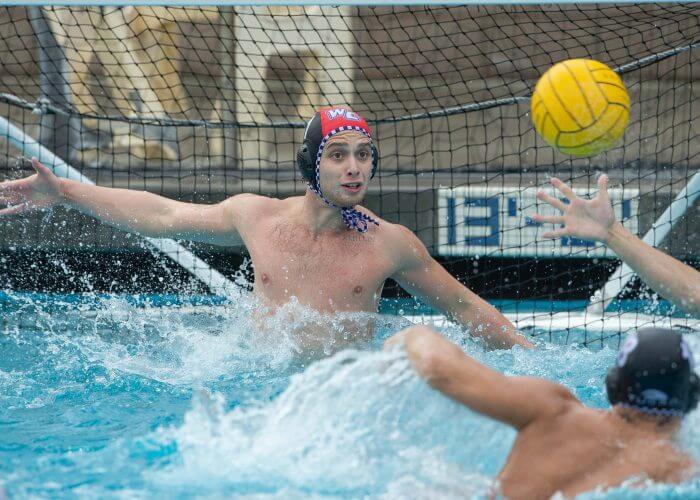
Whittier goalie Murat Ersoz was MVP of the tournament, turning aside 15 shots in the final. Photo Courtesy: Tony Leon
We want to travel to the East coast as a member of the SCIAC, to help promote and grow the sport. I’m looking forward to getting a better understanding with what’s going on in the East Coast and see how we can grow [polo] together.
– From an Eastern perspective, it’s eye-opening to find out about the robust California junior college scene, which is providing playing opportunities to a glut of talented West Coast players.
There may not be enough places for them to play. You’re looking at somewhere between 30 and 40 junior colleges competing statewide and a lot of Division I [programs] aren’t the best fit.
I coached several kids that went to DI schools [and]several that went to SCIAC schools. Some went East, but DIII is a great platform for them to transfer right — for the schools that accept transfers.
I know MIT at John Hopkins probably rarely — if ever — do. Here at Whittier we do. There are a lot of athletes playing and that want to continue their collegiate water polo careers. Hopefully, we’re a platform to have them come to Whittier, but anywhere they go is good.
I would love to see it grow on the East Coast — and I know there’s [athletes] that would love to go East if it was available.
– Can these junior college kids end up in Ottawa or Urbana or some other new program?
They can definitely end up at [there]. I encourage coaches to reach out to community college student athletes. It’s a great way to get some people ready to play right away. They’ve been playing two years under great coaches like Chris Oeding in Long Beach City or Scott Taylor at Golden West.
[The (Growth) Beat Goes on: Urbana University to Add Women’s Water Polo in 2020]
There’s a lot of great coaches in the community college level, and people don’t realize you have an Olympian coaching at a community college or guys that have done really great job for a lot of years. It’s a resource that they should use, [because] it can help develop those programs faster. You can bring in a couple of older guys that have maturity or leadership skills.
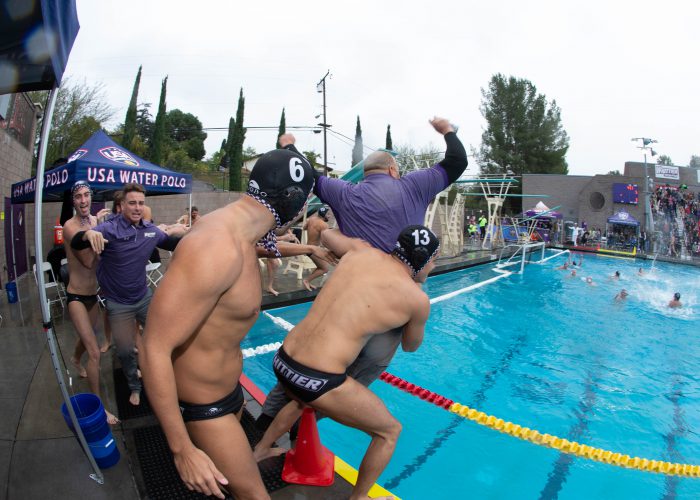
The moment of triumph — brilliantly captured by Tony Leon
That’s one of the things I was able to do. I brought in [Micah Kamai] a guy that won two state championships Golden West. He’s a super fantastic leader for us at Whittier. He went from the community college and was really interested in Division III.
A lot of the schools in SCIAC have great academic reputations as well. A great recruiting tool for us is we were going to a national championship. Something to play for at the end of the year in addition to a SCIAC championship.
– The two Eastern schools — Hopkins and MIT — qualified in October for this tournament. But if they had won their conference tournaments, they could have elected to go to NCAAs. The SCIAC made a very clear decision to support this tournament — which means you didn’t get to play for the national championship.
I’ve been asked quite a few times by people about our decision. Would you rather have the DIII tournament or would you rather have a bid into the DI championship?
From my perspective — and we didn’t get to go to NCAAs this year even though we would have qualified — having something to try to win and finish the season on a win, this best promotes the SCIAC. We had discussions with the SCIAC coaches and our leadership under Jen Dubow [SCIAC] commissioner. [The coaches] discussed it and I agreed that this was the best for our conference, for our student athletes.
– Playing MIT will be new for your players. Do you have expectations about playing an East coast team?
We approach it just like any other game. We watched film on them. We have a game plan for MIT. All of our focus is on this first round game against MIT. We have full respect for their coaching staff and their players. There’s some fantastic players. So just approach it like any other game. Yeah.
– The MIT coach, Austin Ringheim, played for the Poets when they last went to NCAAs in 2014.
I just met Austin recently in a professional matter. I coached against someone who was at Long Beach City College and he was at Golden West. So, I know of him. But yeah, it’s a cool little wrinkle that he was a Whittier graduated.
[On The Record with Austin Ringheim, MIT Water Polo New Head Coach]
– The sell at Whittier is that you have a beautiful campus, strong academics and oh yeah, you’re really good at water polo.
The student athletes that I’m recruiting are choosing this option because they can have a really serious water polo season where they fully commit to polo and commit to my studies. But they don’t have that same commitment, let’s say in the summer where they don’t have any time together. They can do internships and study abroad. That really appeals to them. A lot of them like the small school effect, but the personal attention, the academics.
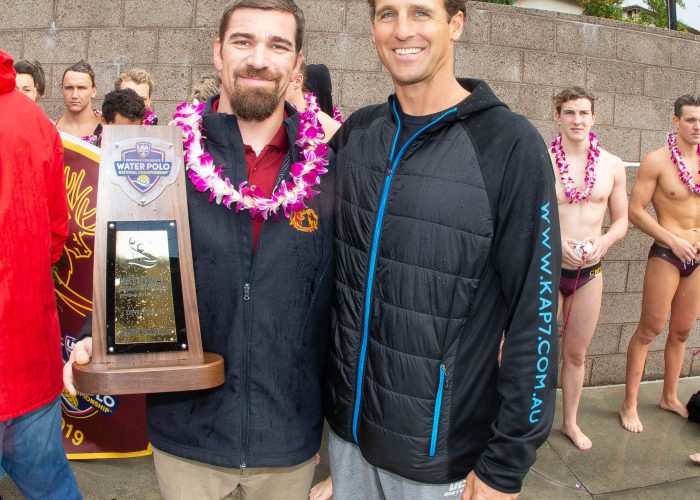
CMS Coach Greg Lonzo (shown here with Wolf Wigo). Photo Courtesy: Tony Leon
My kids love their professors, they love their classes. I know guys that are graduating and going right into jobs. So it’s a good fit overall. It’s a different experience than a DI, more of a balance between academics and athletics where they still feel it’s meeting their competitive needs.
[Now] there’s a national championship, there’s a really great conference that they’re playing in. They have coaches and schools providing a competitive experience where they get to play these top DI teams.
We go to tournaments with the top teams. We’re going to travel. Kind of the best of both worlds.
– A mix of East and West is always good — especially when it happens on the East Coast.
We’re planning on going to Brown for their tournament in February this year and I’ve talked to both our men’s and the women’s programs. They really want to do a travel — so I’ve talked about doing it once over their four year career at Whittier. It’s neat because they can experience so many different things with travel. Not only get to experience playing different teams, different colleges, going to a different college, but just the aspect of traveling. And I feel like there’s so much to learn from traveling as well. Right before you came in, a few of the women’s team came in and they were all asking questions about where we’re going and what do you eat there? What do they have? And the weather and.
It’s funny because they’re just excited about going somewhere as a team. I think traveling together can be a great bonding experience. And that’s my goal as well. Not only getting to play some good water polo teams and different water polo teams, but building the team atmosphere as much as we can.
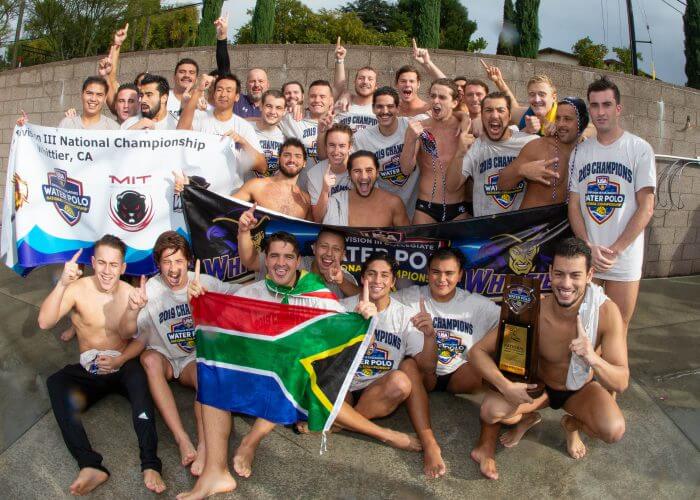
The Poets are both international and stocked with local talent. Photo Courtesy: Tony Leon
– You also see the recruiting possibilities, because there’s talent out East, especially programs like Greenwich and Chelsea Piers in Connecticut.
I believe our program is a great example of, we have people from everywhere. We have people from Europe and Turkey and South Africa. We have a guy on the team from Chicago and Northern California and Southern California. We’ve had people from Connecticut on the team before.
Maybe not everyone on the East Coast knows about Whittier College but it’s an opportunity for them to see us competing and see the quality we have and the professionalism we bring. And maybe it’s an option for them to look into a great academic institution that might be a good fit.
We’re always open to student athletes from anywhere.



